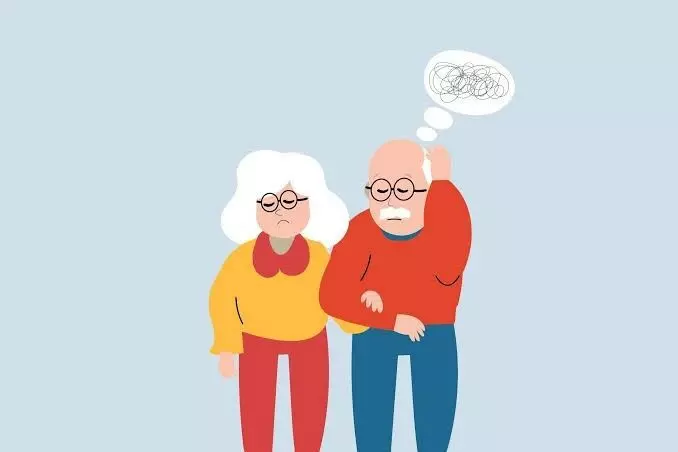What is fade-in-memory? How is it related to Covid?
The researchers found that the characteristics of a particular type of dementia changed following Covid-19, and both degenerative and vascular dementias started behaving like mixed dementia
By Sulogna Mehta
Hyderabad: The latest research on long-term effects on survivors of Covid-19 suggests that the risk of developing neurological and psychiatric conditions such as dementia or progressive forgetfulness is high even two years after the pandemic. In cases of pre-existing dementia, the condition has worsened.
Global study
An observational study of over 1.25 million patient health records done by the University of Oxford, and published in The Lancet Psychiatry journal in 2022 suggests an increased risk of neurological and psychiatric conditions such as dementia and seizures is still higher two years after Covid-19 compared to other respiratory infections.
In adults aged 65 and over who had Covid-19 up to two years previously, there was a higher occurrence of cognitive deficit or brain fog, dementia or progressive forgetfulness, muscle disease, and psychotic disorder.
Indian study: Covid infection aggravates dementia
Infection with the SARS-CoV-2 virus may significantly accelerate dementia in patients already suffering from the neurodegenerative condition, according to a study conducted in West Bengal.
The research, published in the Journal of Alzheimer’s Disease Reports, found that participants with all subtypes of dementia experienced rapidly progressive dementia following infection with SARS-CoV-2.
Insights into the impact of Covid-19 on human cognition have so far remained non-specific, with neurologists referring to it as “brain fog.” The researchers investigated the effects of COVID-19 on cognitive impairment in 14 patients with pre-existing dementia who had suffered further cognitive deterioration following the infection with SARS-CoV-2. The patients included four with Alzheimer’s disease, five with vascular dementia, three with Parkinson’s disease, and two with the behavioral variant of front temporal dementia.
They were recruited out of a total of 550 patients with dementia who attended the wards of Burdwan Medical College and Hospital, Bangur Institute of Neurosciences, and private cognitive specialty clinics in West Bengal, between May 2013 and September 2022.
Findings from the study
The researchers found that the characteristics of a particular type of dementia changed following Covid-19, and both degenerative and vascular dementias started behaving like mixed dementia. A rapidly and aggressively deteriorating course was observed in patients having insidious onset, slowly progressive dementia, and those who were previously cognitively stable, they said. Cortical atrophy, which causes the loss of brain cells, was also evident in the study’s subsequent follow-ups, according to the researchers.
Coagulopathy involving small vessels and inflammation, which were further correlated with white matter intensity changes in the brain, was considered the most important pathogenetic indicator, they said.
Fade-in-memory, not brain fog
The rapid progression of dementia, the addition of further impairments of cognitive abilities, and the increase or new appearance of white matter lesions suggest that previously compromised brains have little defence to withstand a new infection. “Brain fog is an ambiguous terminology without specific attribution to the spectrum of post-Covid-19 cognitive sequelae,” said study lead investigator Souvik Dubey, from Bangur Institute of Neurosciences.
“Based on the progression of cognitive deficits and the association with white matter intensity changes, we propose a new term: ‘Fade-in-memory’ (Fatigue, decreased Fluency, Attention deficit, Depression, Executive dysfunction, slowed Information processing speed, and subcortical Memory impairment),” Dubey added.
The researcher noted that as the aging population and dementia are increasing globally, pattern recognition of Covid-19-associated cognitive deficits is urgently needed to distinguish between Covid-19-associated cognitive impairments and other types of dementia. “This understanding will have a definitive impact on future dementia research,” said Dubey.
Dr. P V Ramana, head of the department of neurosurgery and spine surgery and director of the Institute of Neurosciences, Pinnacle Hospital, Vizag, said: “The coronavirus enters through the nose, affecting the olfactory nerves and further travels to the throat, lungs and to the brain. The brain has a natural structural and functional protection – the blood-brain barrier (BBB), which prevents pathogens and toxins from entering the brain. However, it has been found, the fallout of even mild and moderate cases of coronavirus can disrupt the BBB, causing inflammation and other issues such as brain fog, confusion, memory loss, headache, depression, fatigue, dementia including Alzheimer’s even in recovered patients, several months later.”